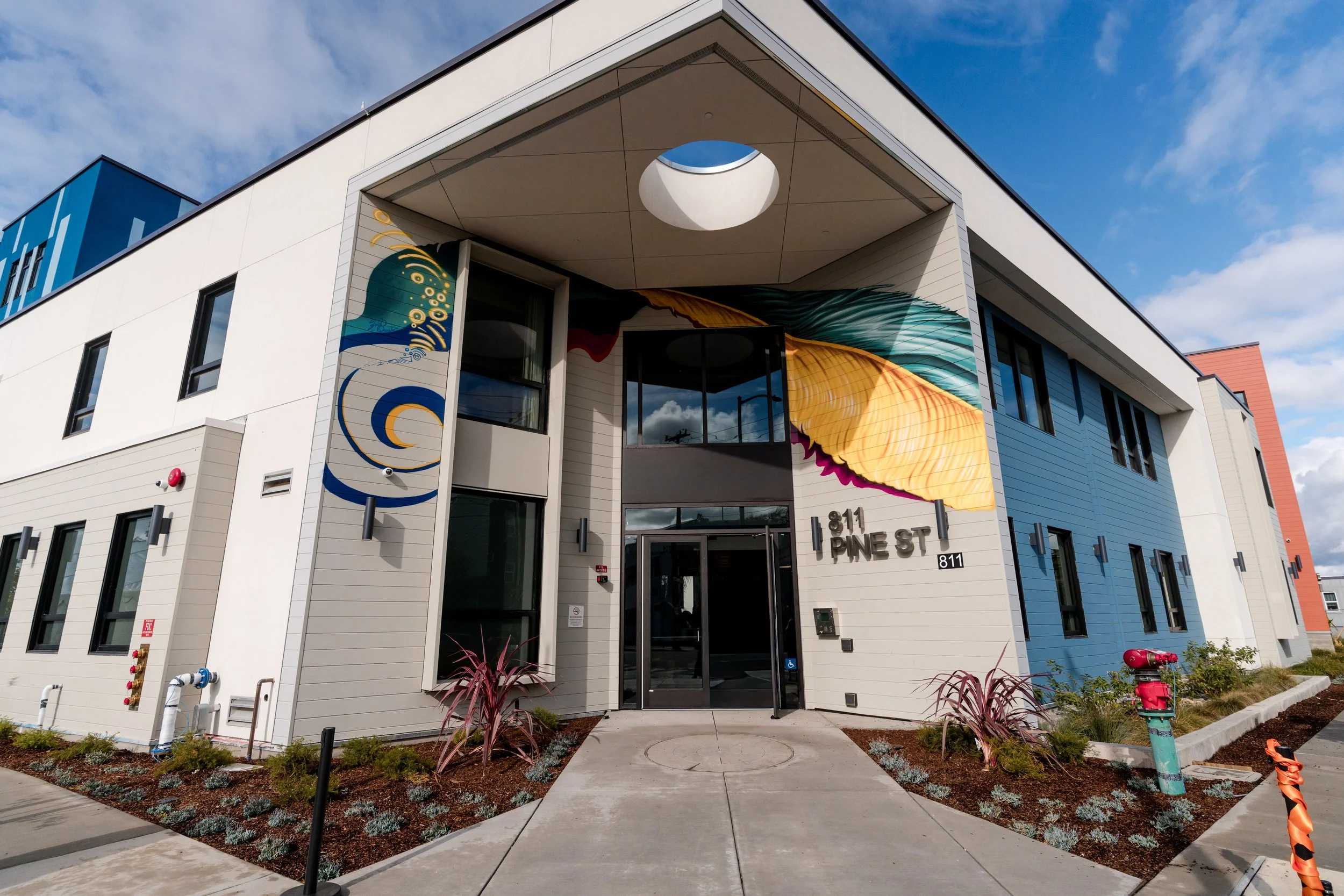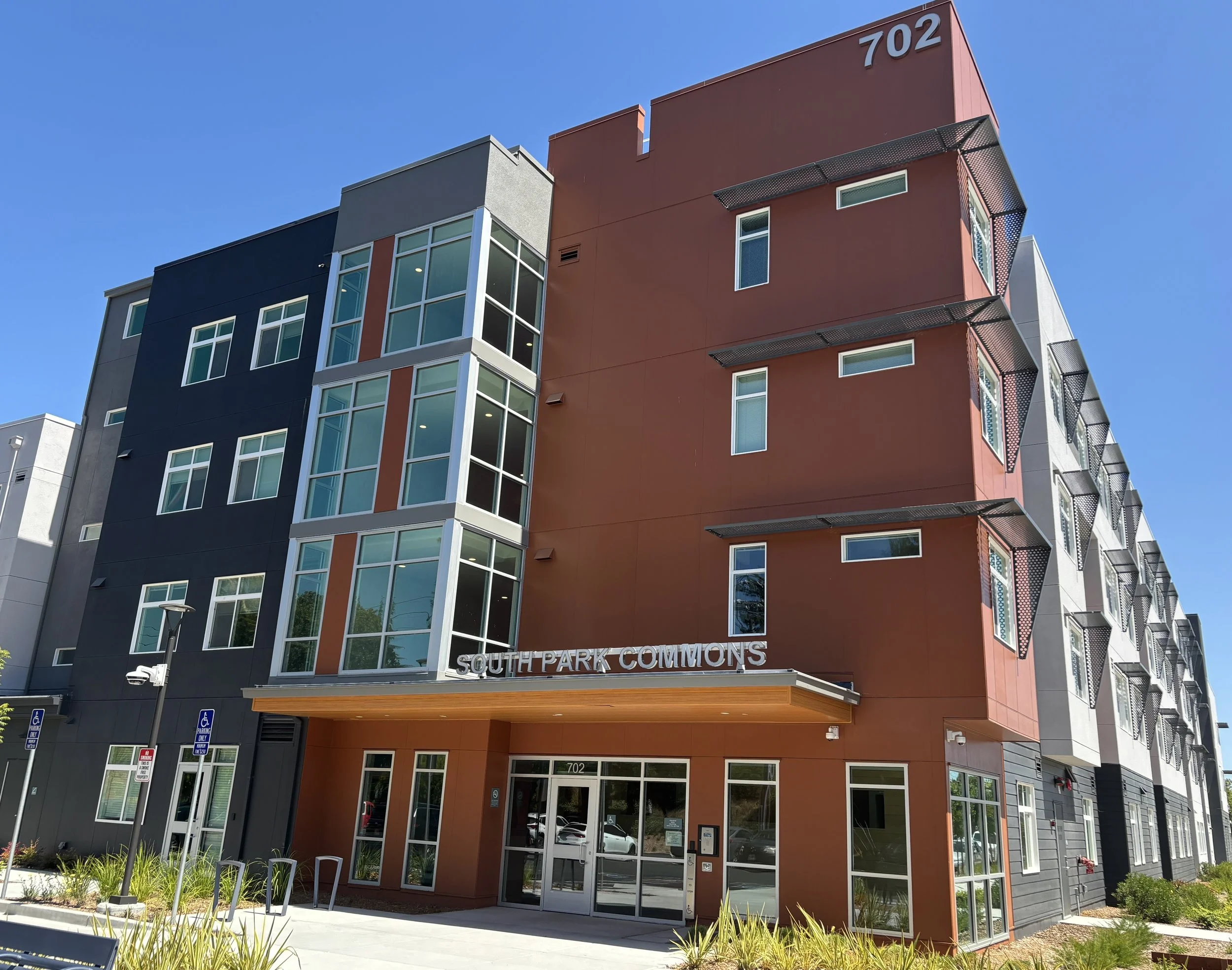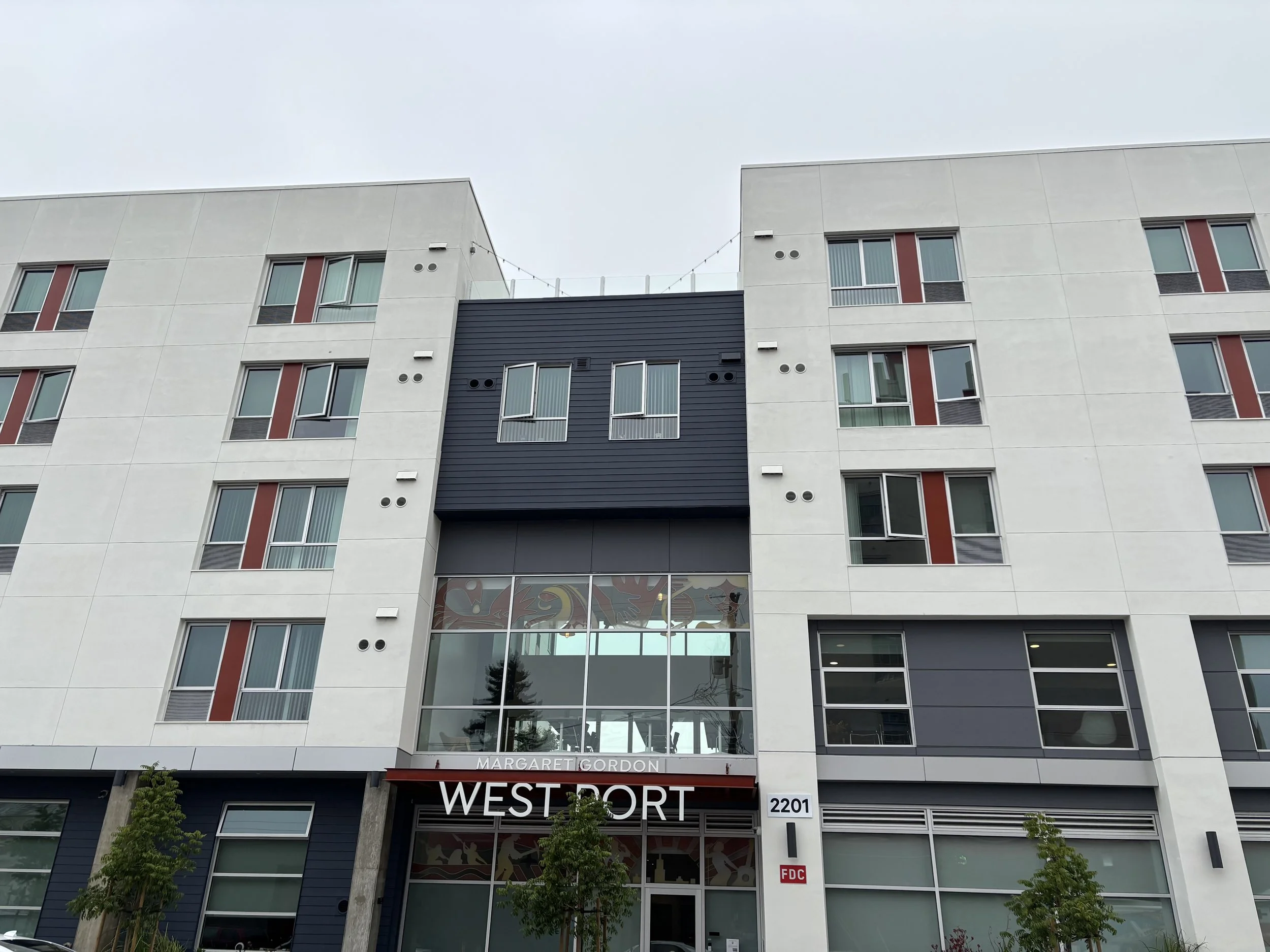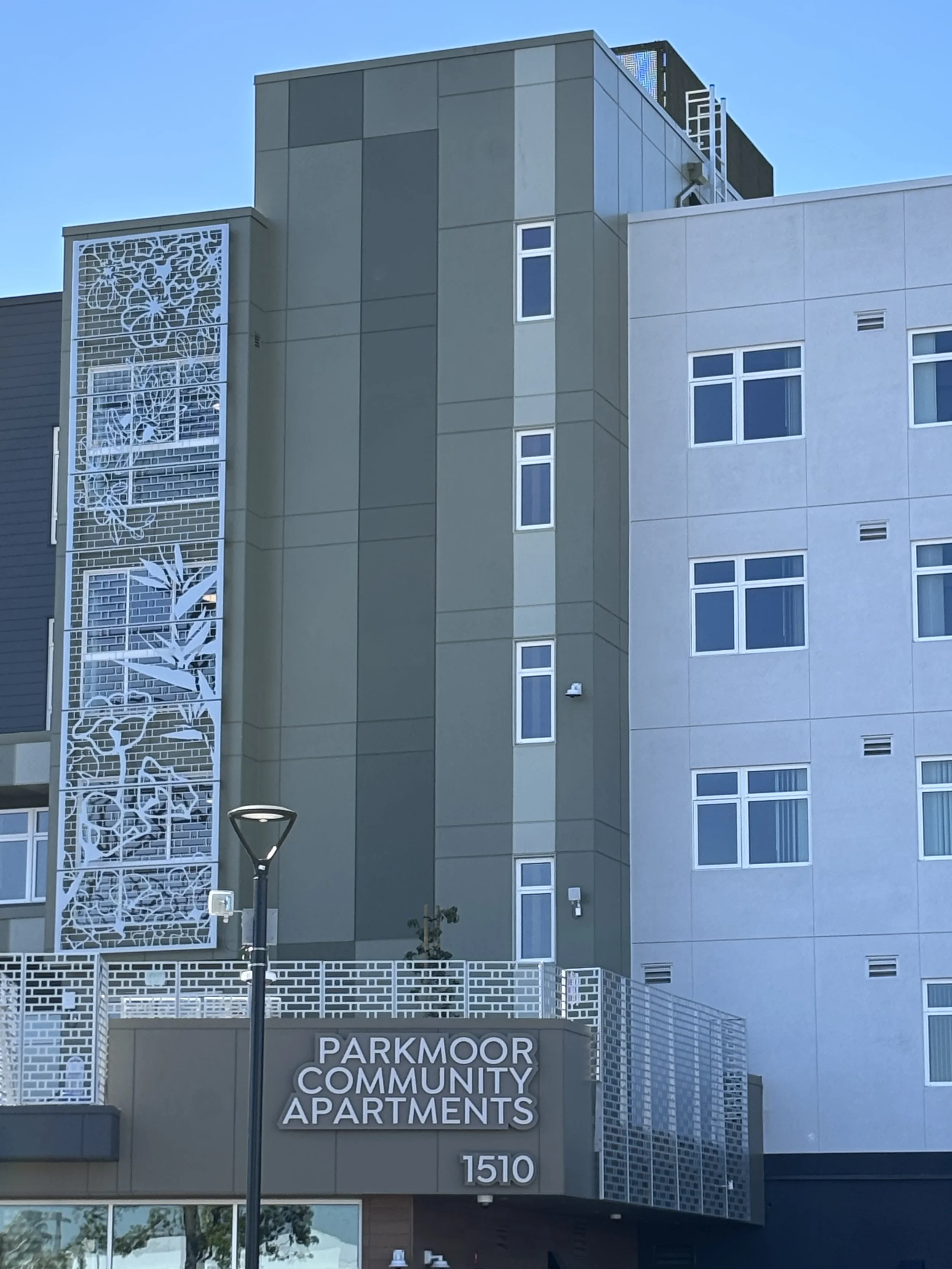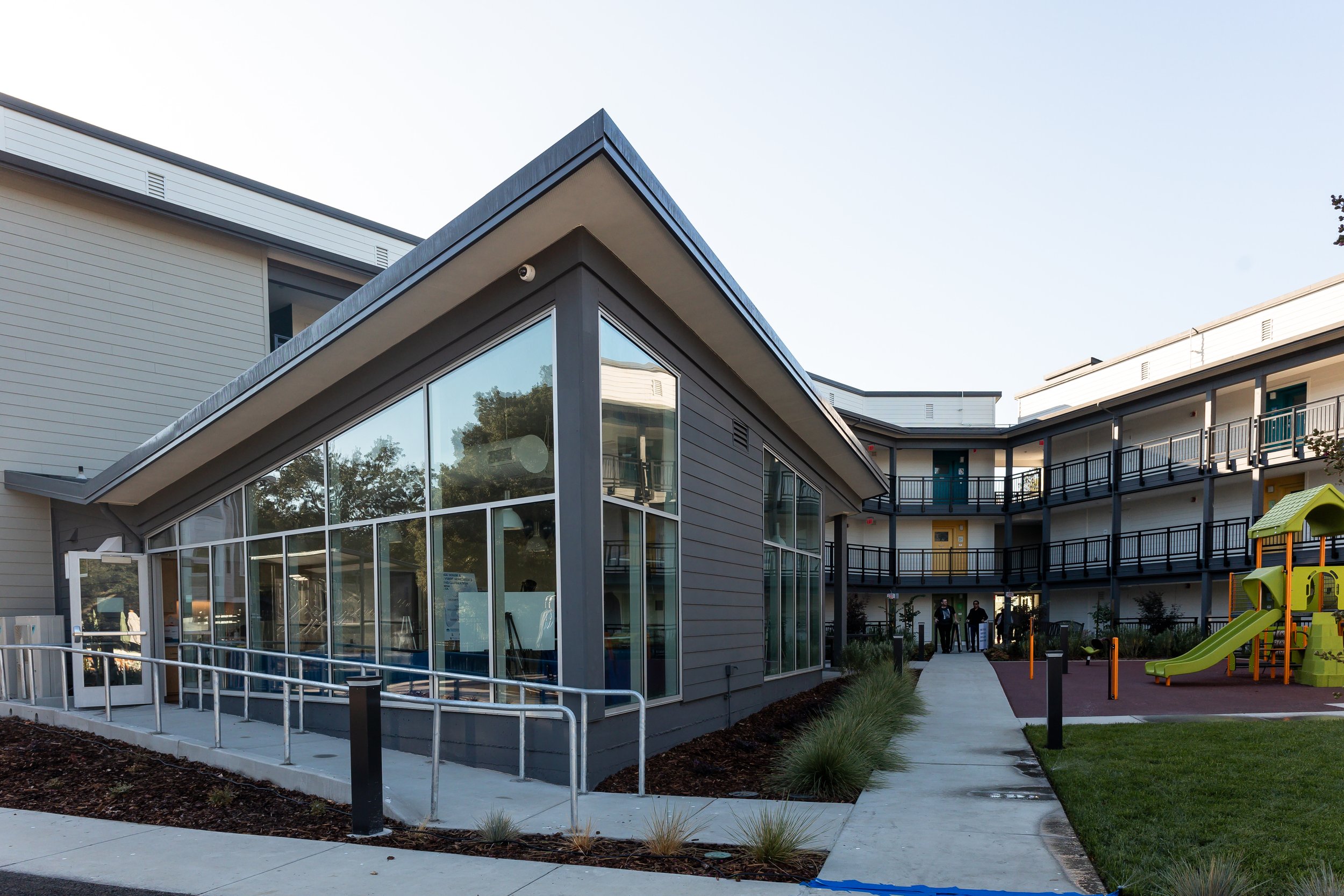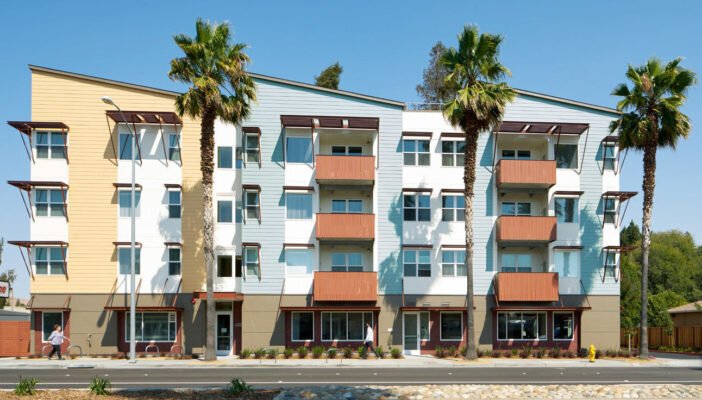Completed Developments
The Phoenix
The Phoenix, a new supportive housing development in West Oakland, has added 100 units of affordable homes for low-income residents - bolstering Alameda County’s affordable housing supply.
The development is a 4-story building located at 801 Pine St. in Oakland’s Prescott neighborhood.
The Phoenix opened in November 2025.
This is the second new affordable housing site on which EBALDC and Abode Housing Development have partnered recently in West Oakland.
The nonprofit organizations also partnered on Margaret Gordon Westport, a 58-unit site that opened in June 2025.
The Phoenix replicates a model of supportive housing that Abode Housing Development has implemented with success in other Bay Area communities.
South Park Commons
South Park Commons a development that adds more than 60 units of new affordable housing in Sonoma County.
The Santa Rosa development is a mix of studio, one-, two-, and three-bedroom units in a housing site where around half of the units are set aside for individuals who have experienced chronic homelessness.
The other units are set aside for affordable housing for households not designated for any specific population.
The affordable housing development opened in mid-2025.
South Park Commons was developed by a partnership between Freebird and Abode Housing Development. The John Stewart Company serves as property manager and Abode provides on-site services.
Margaret Gordon West Port
Abode has partnered with East Bay Asian Local Development Corporation (EBALDC) to create Margaret Gordon West Port, an affordable housing community in West Oakland. The site has added 58 units of permanent supportive housing in Alameda County. It opened in mid-2025. On-site services are provided by Abode Services.
Margaret Gordon West Port was built in part with Measure U funding from the City of Oakland and $7.2 M in Measure A1 funding from Alameda County Housing and Community Development. The project is further supported by over $40 million in funds from three California Department of Housing & Community Development programs – including the California Housing Accelerator. The development also received critical funding through the California Department of Toxic Substances Control Equitable Revitalization Grant Program and Federal Home Loan Bank of San Francisco Affordable Housing Program. The Margaret Gordon West Port community has ongoing rental assistance through 28 Section 8 project-based vouchers, through the Oakland Housing Authority.
Other partners on this affordable housing development include West Oakland Environmental Indicators Project, JPMorganChase, City of Oakland, Oakland Housing Authority, Alameda County Department of Housing & Community Development, California Department of Housing and Community Development, California Department of Toxic Substances Control, Federal Home Loan Bank of San Francisco, Branagh Construction, and Pyatok Architecture and Urban Design.
Kifer Senior Apartments
Kifer Senior Apartments provides 80 units of housing that is affordable to low-income senior households. The six-story building sits on a half-acre property in the city of Santa Clara. The housing site is a combination of 30 studio apartments, 45 one-bedroom units, 4 two-bedroom units, and an on-site manager unit. More than half of the units are reserved for seniors experiencing homelessness and eight apartments are set aside for senior veterans experiencing homelessness.
Residents have access to a community space, rooftop terrace, computer room, secure bike parking for 27 bikes, and 24 vehicle parking spaces. The property is located within walking distance of the Lawrence Caltrain Station for greater connectivity to the broader Bay Area. Abode provides on-site services, including substance abuse support, health and wellness programs and resources, and 84 hours of education and workshops that include vocational employment, financial literacy, and individualized self-sufficiency counseling.
Parkmoor Community Apartments and The HUB Center for TAY
In May 2021, the County of Santa Clara Board of Supervisors selected Abode Housing Development (formerly known as Allied Housing) to develop residential housing and a youth service center at 1510-1540 Parkmoor Ave. in San Jose.
This new development currently known as Parkmoor Community Apartments and The HUB Center for TAY (Transitional Age Youth) will have up to 81 units of affordable and supportive housing, including units for transition-age youth.
These housing units will include studios and one-bedroom, two-bedroom, and three-bedroom apartment homes on a 1.62-acre parcel at the intersection of Parkmoor and Meridian avenues.
The five-story building will feature four floors of housing above The HUB Center for TAY, a youth-led community center dedicated to supporting current and former foster youth ages 15 to 24.
The center will have 17,000 square feet of ground-floor space and will be owned and operated by the County of Santa Clara.
The HUB Center for TAY will house service organizations, provide activity spaces for youth, and serve as a safe, welcoming center with services by youth peers and other caring community members.
This sustainable, all-electric development will have outdoor surface parking spaces, an enclosed mechanical parking lift, and bike storage.
Abode Services will provide on-site supportive services for residents.
Learn more about the Parkmoor Community Apartments and The HUB Center for TAY.
Fremont Family Apartments
This new family development has 54 units on a 1.37-acre property. It is located at 34320 Fremont Blvd. in the city of Fremont’s Northgate neighborhood. The homes are comprised of one, two, and three-bedroom units, as well as a manager’s unit. The development, known as Fremont Family Apartments, provides permanent supportive housing for formerly homeless families or those on the verge of experiencing homelessness.
Abode provides on-site services. Each unit is self-contained with a private bathroom, kitchen and living room/sleeping area.
Residents have access to on-site property management and social services offices, community room, electric-vehicle chargers, laundry room, recreation areas, and an outdoor patio.
Interested in living at Fremont Family Apartments? Click here to fill out an interest form.
Heritage House Apartments & Valle Verde Apartments
Heritage House Apartments and Valle Verde Apartments are two adjacent buildings that feature a combined 90 units of affordable multi-family housing, including 44 permanent supportive housing units. The two sites sit on a nearly 4-acre property at 3700 and 3710 Valle Verde Drive in Napa. The housing communities are dedicated for low-income families and formerly homeless individuals who are low-income or living with developmental or mental health disabilities. Abode provides supportive services to residents with special needs.
Heritage House Apartments is a formerly vacant assisted living facility built in 1988. It has been repurposed and now offers 66 new units, including 58 individual apartments and 8 one-bedroom homes. The units feature individual kitchenettes, new appliances, communal laundry facilities, community spaces, and other resident amenities. Space is set aside for providing supportive services, such as two offices and three private conference rooms. Valle Verde Apartments offers 24 residential units, a property management office, community room, central laundry, and central trash room. It features 12 one-bedroom apartments, 6 two-bedroom units, and 6 three-bedroom homes. Each home has a private balcony, and nearly all units offers views of the creek, central courtyard, and community amenity spaces. The courtyard has a playground, BBQ area, half-basketball court, and paths to public open space.
Abode has partnered on these sites with Burbank Housing, Gasser Foundation, City and County of Napa, Chase, Enterprise, California Department of Housing and Community Development, No Place Like Home, Joe Serna Jr. Farmworker Housing Grant Program, and Abode Housing Development. The architect is Gunkel Architecture.
Doug Ford Senior Apartments
This Fremont development has 90 units of permanent supportive housing for seniors on a 1.4-acre parcel. Its 81 one-bedroom and 9 two-bedroom units provide homes to very low income seniors, half of which have experienced homelessness.
The site, formerly known as Irvington Senior Community Apartments, also features 600 square feet of commercial space on the ground floor.
The Irvington District property is near Fremont’s new BART station, a bus line, grocery stores, and pharmacies.
Doug Ford Senior Apartments includes a fitness room, computer labs, community garden, dog-walking area, and other outdoor recreational space, as well as community rooms where classes, meetings, and celebrations can be held. Abode provides on-site services at this housing community.
City Center Apartments
City Center Apartments is a supportive housing development that has transformed a Fremont used-car lot into 60 units of green and modern affordable housing. It is located at 38631 Fremont Blvd.
Larry Mayers of Mayers Architecture designed the development, which features 30 studio homes, 29 one-bedroom units, and a manager apartment in a fully ADA-accessible building on a 1-acre property. Three-quarters of the units are reserved for people experiencing homelessness, including 29 units for veterans. Residents have access to on-site property management and social services offices, bike parking, storage areas, computer lab, and laundry facilities.
Construction at City Center Apartments began in early 2020 and finished in late 2021.
Depot Community Apartments
Depot Community Apartments features 125 studio units and a manager’s unit in the Mt. Eden neighborhood in Hayward, as the city’s first all-electric new development that achieves the highest sustainability compliance. The development, which stands 3 and 4 stories high, provides permanent supportive housing for formerly homeless individuals or those on the verge of experiencing homelessness. We designed the 3-acre site with a special focus on shared amenities and spaces to build community and support self-stabilization. We share the site with Cronin House, an existing transitional care facility.
Abode provides on-site services. Each unit is self-contained with a private bathroom, kitchen and living room/sleeping area. Residents have access to on-site property management and social services offices. They also have access to a community room, bike storage, electric-vehicle chargers, dog park, BBQ area, computer lab, half-basketball court, laundry room, private lockers, community garden, art commissioned by local artists, and an outdoor patio for residents.
Cedar Community Apartments
Cedar Community Apartments is a 125-unit existing hotel located at 39802 Cedar Blvd. in Newark. It currently is an extended stay hotel with studio, 1-bedroom and 2-bedroom units that are set up as apartments with full kitchens and fully furnished living spaces. The residential units’ interiors will need only minimal improvements. The site is close to grocery stores, transit, pharmacy, parks, and schools.
Abode Housing Development is partnering with the City of Newark to apply for California Housing and Community Development Homekey funding, along with local funding commitments from the City of Newark, the County of Alameda, the Housing Authority of the County of Alameda, and the Alameda County Health Care Services Agency. The Homekey program allows for converting the property to a residential apartment building with streamlined legislative and environmental approvals. After the property is purchased and renovated, it will have approximately 124 apartment units, including one unit for an on-site resident manager. It also will have property management and services offices, meeting rooms, a community room, and exterior amenities and open space for the residents. This development is an opportunity for Newark to create more than 120 homes that are affordable to the people that live in them in under a year. That time frame is much quicker than the typical affordable housing development process, which generally takes at least 4 years. It is also an opportunity to secure state and county funding at a ratio of about 7 to 1 to Newark’s funding level. This will make a significantly positive impact on fulfilling the affordable housing needs of Newark and provide homes to vulnerable households in our community.
Want to apply to live at Calabazas?
Calabazas Community Apartments
Calabazas Community Apartments features 145 studio homes in a fully ADA-accessible building on a 1-acre site near Caltrain’s Lawrence Station and the Lawrence Expressway in Santa Clara. Calabazas offers high-quality affordable rental housing that are integrated into the community.
On-site amenities include property management and social services offices, laundry, community room, computer lab, and a pet-friendly environment. Abode provides on-site services such as job assistance, financial literacy, computer training, case management, and health education and activities. About 80 of Calabazas’ homes are set aside for individuals experiencing homelessness. Construction began in late 2019 and finished in late 2021.
Fruitvale Studios
Abode worked with a team of architects and engineers to renovate Fruitvale Studios, a 24-unit apartment building that provides homes to very low income individuals and small households, half of which have experienced homelessness.
The three-story complex was built in 1927. It stands on a 0.19-acre parcel in Oakland’s Fruitvale District.
Each of the property’s 24 homes is a studio, including one manager’s unit. The renovation work included new replacement windows, brick veneer stabilization, plumbing infrastructure upgrades, minor accessibility improvements, and general cosmetic upgrades to some of the units.
Laguna Commons
Abode and MidPen Housing partnered to develop Laguna Commons, which provides supportive housing for military veterans, individuals, families and formerly homeless households. Laguna Commons, a 1.5-acre site in Fremont, is near grocery stores, a public park, pharmacies and transit lines. Twenty-five of the development’s 64 units have been set aside for veterans.
Staff members are onsite to help residents access a wide range of supportive services and programs. Services include case management, mental health care, health-and-wellness programs, job counseling and placement, financial literacy classes, and youth afterschool programs. Laguna Commons opened in 2016.
Lorenzo Creek
Abode partnered with Resources Community Development to develop Lorenzo Creek, which offers permanent, affordable, and supportive housing units for formerly homeless and disabled people living in southern, eastern, and mid-Alameda County. The 28-unit Castro Valley site is available to households ranging form permanently affordable to very low income. The development is linked to an integrated network of on- and off-site services specifically designed to address the multiple needs of formerly homeless and disabled persons. Universal design features are also incorporated to further serve persons with a variety of disabilities, helping them live independent, stable, and healthy lives.
Amenities on the site include office space for property management and services, a laundry room, elevator, two community rooms, courtyards, and other open spaces. Abode provides services that include financial literacy, life-skills training, parenting classes, case management, job training and referrals, and connections to community resources.
Casa de Novo
Abode has converted this former hotel in San Jose into a supportive housing site that provides long-term and temporary housing for individuals who are homeless.
The 56-unit site, formerly known as the Santa Clara Inn, has been renamed Casa de Novo to convey its transformation into a place where people can make a fresh start at a new home. Abode provides housing, case management, and other social services to the site’s long-term and short-term residents, as well as handle daily property management, security, repairs, and maintenance.
Twenty-seven rooms at Casa de Novo are set aside for long-term supportive housing for homeless persons. The property’s other 29 rooms operate as a hotel and rent rooms by the day, but focus on providing temporary supportive housing for patrons referred from the City of San Jose, the County of Santa Clara, agencies that serve homeless veterans, and nonprofit groups that assist individuals and families who are experiencing homelessness.
Resetar Residential Hotel
Resetar Residential Hotel is a 90-unit housing site in downtown Watsonville. The former hotel, which was built in the 1920s, has been converted into 12 one-bedroom apartments and 78 studio apartments. It has more than 100 residents, about half of which were formerly homeless. In its heyday in the mid-20th century, the hotel was a hub of activity in Santa Cruz County. Today, the building remains close to public transit and shopping. Resetar Residential Hotel’s amenities include a laundry room, community room, food pantry, and on-site property management and services.
Abode has two full-time on-site service coordinators providing services to residents that include life-skills training, financial literacy classes, educational workshops, health-and-wellness programs, case management, housing stability services, and recovery support.
Plaza Hotel
The Plaza Hotel has been converted into a site of interim supportive housing in downtown San Jose. The former hotel was originally built in 1961. It opened in early 2018 after sitting vacant for eight years. Today, it offers 46 units of interim supportive housing for individuals who were homeless on entry but are part of an off-site rehousing program that is preparing an apartment for them.
Abode provides on-site property management and services for residents, helping them to be ready to move directly into their permanent housing once it is available. Services offered there include financial planning, life-skills training, coordination with housing services, connection to community resources, and benefits acquisition.
The residents have furnished rooms with a TV, dorm-size refrigerator, microwave, table, chair, and storage. They also have on-site access to a community room, computers, laundry room, and parking in a nearby garage.
Main Street Village
Abode and MidPen Housing partnered to create Main Street Village, a 64-unit development on 1.57 acres in Fremont. The site is conveniently located near a grocery store, pharmacy, public park, and transit lines, and is within walking distance to public schools.
Main Street Village’s residents include families and individuals earning between 15 percent and 50 percent of the area median income. The development incorporates green features, such as bay friendly landscaping, a solar thermal hot-water system, photovoltaic panels, energy-efficient electrical and plumbing fixtures, and on-demand hot-water heaters in every unit. It opened in 2011.
Mission Bell
Mission Bell Apartments features 25 renovated supportive housing units targeted for low-income seniors.
The formerly market-rate apartment building reopened in 2006 after renovations were completed by Abode. Abode provides on-site social services to all Mission Bell residents. Services are funded from both rental income and from Alameda County Behavioral Health Care Services.
Mission Bell has an enclosed open-air courtyard and parking garage for residents. Five commercial tenants occupy street-level space in the charming mission-style building, which was built in the 1920s.
Carmen Avenue Apartments
Carmen Avenue Apartments is a 30-unit multifamily supportive housing development in Livermore. The one-acre property offers affordable housing and supportive services to community members that are homeless or at risk of becoming homeless, including domestic violence survivors, youth aging out of the Alameda County Foster Care system, and physically disabled persons. Carmen Avenue Apartments is near public transportation, shopping, employment, and educational facilities. Amenities include a community room, office space, laundry room, play area, and gathering area with a barbecue pit.
This development was the most highly scored GreenPoint Rated affordable housing project in the state of California when it opened in 2008. It incorporates energy efficiency technology, waste reductions and use of sustainable materials into its design. An on-site service coordinator helps residents access needed off-site services.

